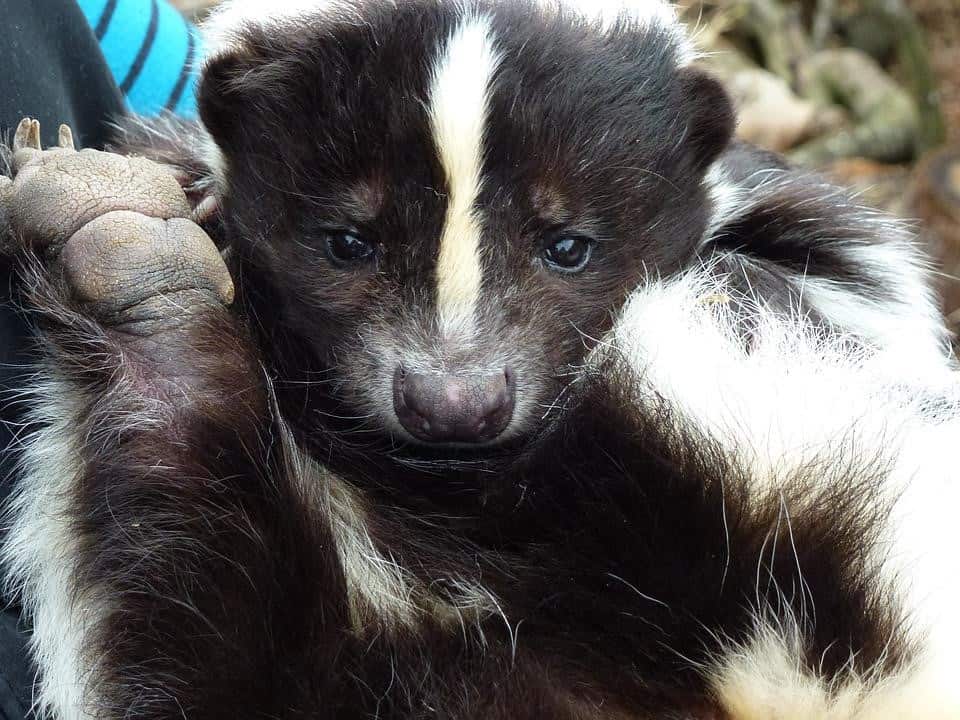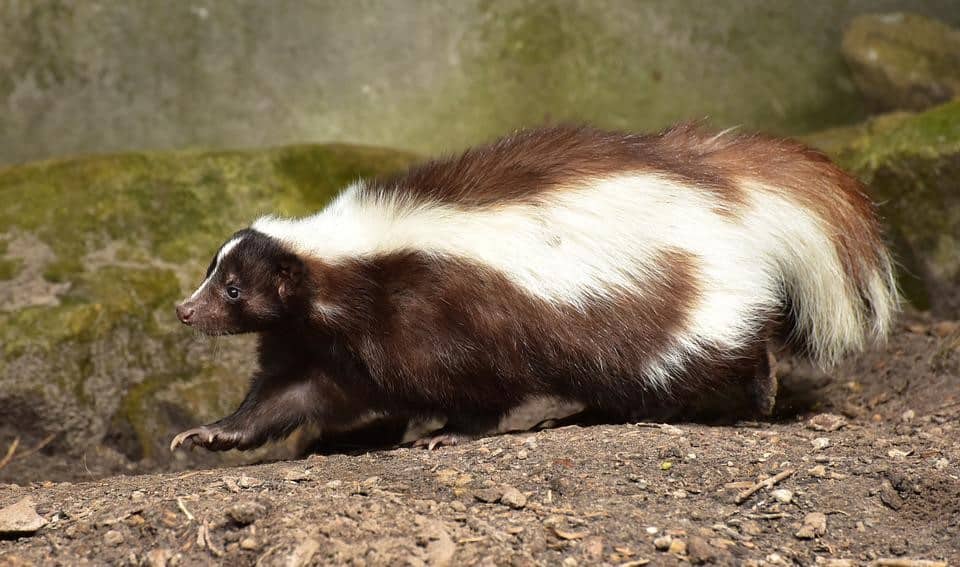Do skunks eat chickens, and if so, what can you do about it? There’s a good chance that whenever you hear the name “skunk,” the first thing that comes to mind is an animal dressed like a cartoon villain capable of producing what is arguably the foulest smell in North America. However, for people raising chickens, skunks are much more than just a respiratory nuisance; they are a deadly chicken predator.
While skunks aren’t typically ranked high on the “backyard flock predator” list, they are still on it. As a result, if you keep chickens and are suddenly experiencing chicken loss, skunks are one of the animals to keep an eye out for.
Can Skunks Eat Chickens ?
Do skunks eat chickens? Yes and no. Skunks aren’t particularly fond of adult chickens. However, this doesn’t mean that they avoid them. Skunks can injure, maim, or even kill adult chickens if they stand in the way of what the skunk wants – young chicks and delicious chicken eggs.
So, to answer the question, do skunks eat chickens? Yes! They are fond of swiping young chicks and chicken eggs, but they rarely attack and eat grown chickens.
Even though skunks are more interested in baby chicks and eggs, they are what is referred to as “opportunistic killers.” They don’t necessarily hunt grown chickens, but should they encounter one, they will look to kill and eat it.
Since skunks have sharp teeth and claws, backyard chickens are no match for them. A skunk will most likely tear out the chicken’s throat, after which they will try to eat as much of the chicken as possible before scurrying off.
Do Skunks Eat Eggs and Chicks?
Again, skunks do eat eggs and baby chicks. In many cases, this is what skunks are after. In most cases, any dead adult chicken you find as a result of a skunk attack was simply a chicken in the wrong place at the wrong time.
Being opportunistic killers and hunters, skunks tend to go for “soft targets,” which make for easy prey. In the case of a chicken coop, this will be the eggs and younger chickens. Often, you will find eggs missing and maybe a few chicks after a skunk raid on the coop.
How to Tell if Skunks Are Entering the Chicken Coop
Skunks don’t climb over your backyard fencing like raccoons and most other predators. They are more likely to dig under the barrier to gain entry. Since they are nocturnal creatures, spotted or striped skunks attack in the dead of night.
There are, however, some telltale signs of a skunk raid. Here is what to look for:
- The terrible smell: Skunks have a signature foul odor that sets them apart from every other animal on Earth. There’s a good chance that the skunk could get startled while in the act of stealing the chicken eggs or baby chicks from the larger birds. When this happens, skunks release a foul odor as a defense mechanism, and that smell lingers for a while.
- Tracks: The tracks of a skunk can easily be mistaken for those of a raccoon. Skunks have five toes with claws that tend to drag along their path.
- Dug holes: Skunks love feeding on crop-destroying insects such as hornworms, Japanese beetles, and cutworm larvae. In many cases, they also dig up your land to find food or gain entry. You will often find 3-4 inch deep holes where the skunk has been.
- Missing eggs and young chicks: If you are suspiciously missing some eggs and maybe a few baby chicks, you should immediately look for other signs to confirm that a skunk was the culprit. In many cases, you will also find scattered chicken feathers if a fight between a skunk and an adult bird occurs. Best egg laying chickens
It should be noted that there are other types of chicken predators, such as great-horned owls, snakes, raccoons, and other wild animals that would love to have a go at your chicken coop. However, unlike skunks, not very many of them burrow into the coop. Learn how to keep owls away and best animal control tips to keep away all sorts of pests.

How to Keep Skunks from Entering the Chicken Coop
There are several skunk deterrents and strategies you can put into place to keep your chicken coop safe from skunk invasions. Here are a few that you can employ today.
Remove Skunk Attractants
As mentioned, skunks are opportunistic creatures who always seek an easy meal. Some attractants that could have skunks making a beeline to your property include:
- A dirty chicken coop: Skunks love eating eggs and young chicks. If they pick up the smell of a dirty chicken coop, they will wager that there might be some eggs or chicks to be had. It’s imperative to keep your chicken coop as clean as possible to keep this from happening.
- Trash: Skunks also like rummaging through your trash cans for whatever they can find. If you have trash lying around on your property, skunks will want to see what’s in it and, as a result, might end up venturing into your chicken coop since they are opportunistic. Making sure your trash is collected on time and keeping the trash can lids tightly shut will discourage these forays.
- Chicken eggs: These are easy meals for skunks. It’s, therefore, important to collect the eggs as frequently as possible. Once the skunk realizes there are no eggs to be had there, they will most likely move on.
- Use beneficial nematodes: If you frequently find 3–4 inch deep holes on your property, it’s a safe bet that skunks are trying to get to some grubs. One of the best ways to eliminate this food source is to use an organic pest control option such as beneficial nematodes. While effective in killing off grubs that attract skunks, it’s harmless to pets, humans, and earthworms.
- Keep pet food secure: Skunks are also attracted to pet food. Keeping it locked away and secure is the best way to keep skunks from trying their luck.
Secure the Chicken Coop
As mentioned, skunks like to dig under the property to get inside. One of the best ways to secure your chicken coop is to ensure it’s tightly secured so skunks can’t easily get in, if at all. Here are some tips you can follow:
- Protect the chicken coop with a wire fence.
- Place barbed wire, angled outwards, at the top of the fence. This will keep skunks and raccoons from trying to climb over.
- Bury about two feet of chicken wire along the fence to keep skunks from digging under it.
- Put out skunk traps to catch and relocate them from your property. Be sure to check state laws on this issue where you live.
Use Cayenne Pepper Flakes
Cayenne pepper is a wonderful skunk deterrent. In fact, it’s a good deterrent to many chicken predators. The best part is that your chicken won’t be bothered by the cayenne pepper flakes because they don’t have the capsaicin receptors that allow them to taste the heat in the pepper. Skunks, on the other hand, will completely avoid the area.

Surround Your Yard With Ammonia Soaked Rags
According to folklore, placing ammonia-soaked rags around your yard will keep skunks from venturing onto your property. It’s believed that the scent of ammonia on those rags is similar to the urine of a much larger predator, which probably won’t tolerate smaller animals like skunks foraging in its territory. Simply place these ammonia-soaked rags in metal containers such as coffee cans, baking trays, etc.
You could also use domestic dogs and even cats. These animals near your chicken coop will keep skunks from venturing into it.
Skunks, although usually harmless apart from the foul smell, can be a real nuisance when raising chickens. While they don’t typically attack larger birds, they are some of the most prolific chicken predators for baby chicks and chicken eggs. The abovementioned steps will help you secure your chicken coop and keep your chickens safe from skunks.
10 Tips for Raising Backyard Chickens for Beginners
Tips for Raising Roosters

